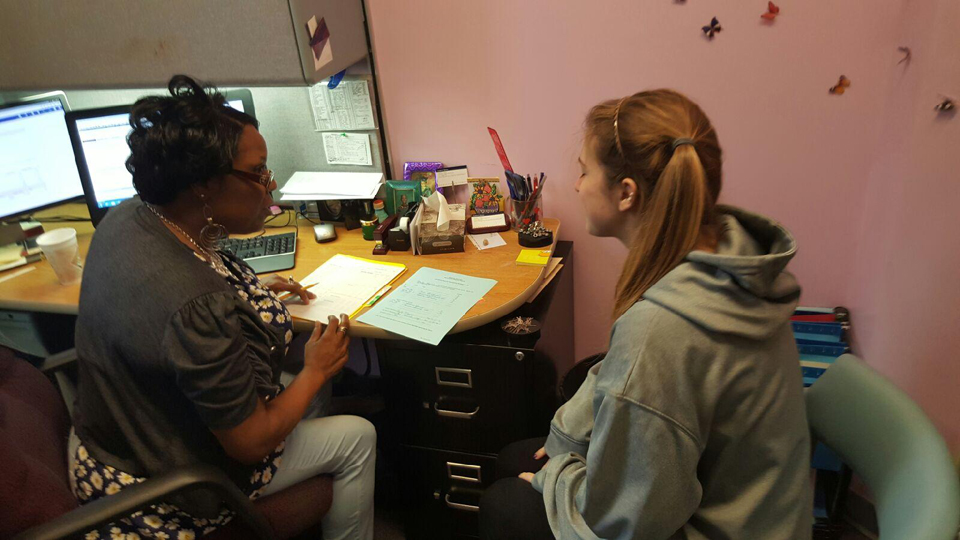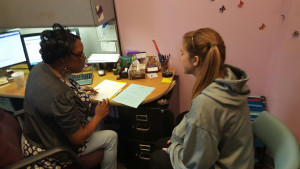

Carmen Thomas, an advisor in the liberal arts school, meets with a student in her office during registration time. A single advisor can serve more than 200 students.
By Carolyn Conte | The Duquesne Duke
As students scramble to register for spring classes or, for some seniors, arrange their graduations, academic advisors engage with large numbers of students more than any other time of the year.
That’s why the Student Government Association is putting together an evaluation form that students will be able to use to highlight the strengths and weaknesses of their personal advisors.
According to SGA President John W. Foster, the new forms will be available online in February, giving students the ability to provide direct feedback on their advisors for the first time in recent Duquesne history.
“[February is] the time when all students who’ve registered for the first time have experience [from the fall semester], and we can find out what they’re looking forward to in the upcoming fall semester,” Foster said.
The SGA plans to revamp the current Student Evaluation Survey that is sent out at the end of each semester to allow students to critique their professors. The updated forms will contain five questions about students’ advisors, with one or two open ended comments.
“It should be a heads up from the students for advisors,” Foster said. “We want to be able to give insight to what we’re doing well and what we can do well.”
This can be crucial for students who feel like they are not on path or need better access to their advisors.
“Some of my friends have trouble getting in touch with their advisors quickly,” occupational therapy major Emily Gallagher, 19, said.
Others may want to tell their advisors to continue what they do well.
“Part of the reason I transferred [to Duquesne] was actually because I didn’t feel like I was being advised enough,” finance major Adrian Cisneros, 21, said. “Here I feel like I know my path and plan.”
Most advisors schedule courses, track credits and host programs for at least 200 students.
Gita Maharaja, one of five advisors in the McAnulty School of Liberal Arts, serves close to 300 of the 1,500 liberal arts students. Though advisors generally work from 8:30 a.m. to 4:30 p.m, she said work can be unpredictable.
“Sometimes students come in at lunch,” according to Maharaja, so advisors adjust to each other’s needs and schedules.
During registration, liberal arts advisors meet with a new student every 30 minutes to discuss their past and future academic progress. Student meetings are only part of the job, though.
“We are on our emails the whole day,” Maharaja said. “In between appointments, after work hours, a lot of the time. I would say 30 to 40 percent of the work is emails.”
Some advisors even work well past their hours until late into the evening, even until 8 p.m. or 9 p.m. daily.
Some students have complained they do not feel prepared enough by their advisors, but others find their advisors to be easy to reach and helpful.
Pharmacy major Steven Amoroso, 18, said that he finds scheduling easy thanks to Starfish, an online tool for students to make appointments.
As he sat waiting for his appointment with his advisor, he said, “My experience has been pretty good with advisors.”




